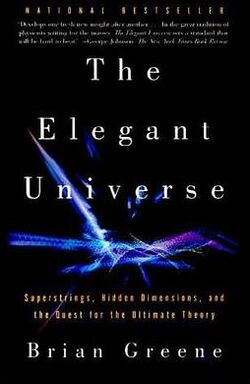Physics:The Elegant Universe
 Hardcover edition | |
| Author | Brian Greene |
|---|---|
| Cover artist | Sherry Love |
| Country | United States |
| Language | English |
| Subject | String theory |
| Genre | Non-fiction |
| Publisher | W. W. Norton |
Publication date | 1999/2003 |
| Media type | Print (hardcover and paperback) |
| Pages | 448 pp. (2003 edition) |
| ISBN | ISBN:0-393-05858-1 (2003 edition) |
| Followed by | The Fabric of the Cosmos |
The Elegant Universe: Superstrings, Hidden Dimensions, and the Quest for the Ultimate Theory is a book by Brian Greene published in 1999, which introduces string and superstring theory, and provides a comprehensive though non-technical assessment of the theory and some of its shortcomings. In 2000, it won the Royal Society Prize for Science Books and was a finalist for the Pulitzer Prize for General Non-Fiction. A new edition was released in 2003, with an updated preface.
Table of contents
- Preface (with an additional preface to the 2003 edition)
- Part I: The Edge of Knowledge
- Part II: The Dilemma of Space, Time, and the Quanta
- Part III: The Cosmic Symphony
- Part IV: String Theory and the Fabric of Spacetime
- Part V: Unification in the Twenty-First Century
Contents
Beginning with a brief consideration of classical physics, which concentrates on the major conflicts in physics, Greene establishes a historical context for string theory as a necessary means of integrating the probabilistic world of the standard model of particle physics and the deterministic Newtonian physics of the macroscopic world. Greene discusses the essential problem facing modern physics: unification of Albert Einstein's theory of General Relativity and Quantum Mechanics. Greene suggests that string theory is the solution to these two conflicting approaches. Greene frequently uses analogies and thought experiments to provide a means for the layman to come to terms with the theory which has the potential to create a unified theory of physics.
Adaptations
The Elegant Universe was adapted into an Emmy Award-winning[1] three-hour program in three parts for television broadcast in late 2003 on the PBS series NOVA.[2]
- Einstein's Dream
- String's The Thing
- Welcome To The 11th Dimension
The Elegant Universe was also interpreted by choreographer Karole Armitage, of Armitage Gone! Dance, in New York City. A performance of the work-in-progress formed part of the inaugural World Science Festival.
See also
Footnotes
- ↑ "PBS wins eight news and documentary Emmys - 2005 Emmy Awards". Today.com. 14 September 2004. https://www.today.com/popculture/pbs-wins-eight-news-documentary-emmys-wbna6004370. Retrieved 10 March 2010.
- ↑ WGBH Educational Foundation (2003). "The Elegant Universe". PBS NOVA. https://www.pbs.org/wgbh/nova/elegant/. Retrieved 2006-06-04.
References
- Brian Greene, "The Elegant Universe: Superstrings, Hidden Dimensions, and the Quest for the Ultimate Theory", Vintage Series, Random House Inc., February 2000 ISBN:0-375-70811-1
External links
- "SparkNotes: The Elegant Universe". Barnes & Noble. 2004. http://www.sparknotes.com/lit/elegantuniverse/. Retrieved 2006-06-04.
- The Elegant Universe on IMDb
- "Science & the City" podcast of Armitage's adaptation, produced by the New York Academy of Sciences
- Perkowitz, Sidney (11 June 1999). "The Seductive Melody of the Strings". Science 284 (5421): 1780. doi:10.1126/science.284.5421.1780a.
- Brown, Laurie M. (June 2004). "Reviewed Work: The Elegant Universe: Superstrings, Hidden Dimensions, and the Quest for the Ultimate Theory by Brian Greene". Isis 95 (2): 327. doi:10.1086/426259.
- Santiago, Luis E. Ibáñez (November 2000). "Un viaje hacia la teoría final" (in es). Revista de libros de la Fundación Caja Madrid (47): 28.
 |

